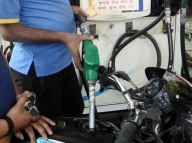Even as petrol and diesel prices in India have been on the rise for the last few days, they have not hit food prices. While the recent increase in fuel prices will be felt only with a lag, experts said that food prices, which have remained in check until now, may not be significantly impacted as other factors including overall production and monsoon pattern also determine the value.
Besides, the aam admi has also not been severely hit due to Covid 19 induced restricted mobility.
As on Sunday, price of petrol in Delhi, Mumbai, Chennai and Kolkata was at Rs 90.58, Rs 97.00, Rs 92.59, Rs 91.7 per litre, respectively, hovering close to the three-digit mark.
Experts said that the prices could remain high for the next few weeks.
“We need to understand the reasons for fuel price hike. Global prices have increased significantly in the last few months but besides this we need to take into account that the government has announced several social welfare schemes in the wake of the pandemic which hit economic growth. Both centre and states—need revenue and this is an important way of generating revenue,” Narendra Taneja, energy expert said. He pointed out that the increase in prices is also helping the state governments. “A large chunk of this is going to the states, so it is not the Centre which is benefitting alone,” he said.
Nirupama Soudararajan, senior fellow and head of research, Pahle India Foundation (PIF) explained that food inflation is not dependent on fuel price alone.
“Prices of food items will be impacted only after a few weeks, so it would be felt with a lag but it is important to analyse how much increase in fuel prices will impact food prices. Second, in terms of pricing, a lot will depend on other factors such as overall production and monsoons,” Soudararajan said.
The increase in prices is a direct fallout of the global crude price hike on one hand and limited fiscal space available to the centre and the states in the wake of the Covid 19 pandemic. Interestingly, the rise in petrol and diesel prices have not yet had an impact on food prices.
India imports over 85 per cent of its total oil requirements.
Global crude prices have risen about 50 per cent since October when touched $40.1 a barrel. Currently, while WTI crude is priced at over $59 a barrel, Brent crude is over $62. Though it is much lower than the $107 per barrel in 2013-14, analysts said that there is little that the government can do at this juncture. However, they also noted that the low food inflation has come handy.
Fuel prices, which are outside the ambit of the goods and services tax (GST), differ from state to state.
The petrol prices are based on excise duty and Value Added Tax (VAT) besides other charges which include freight costs and dealer commission. While the excise duty is collected by the central government, VAT goes into state government kitty. Both excise duty and VAT have been increased in the last few months.
As the opposition Congress has launched a scathing attack on the Narendra Modi government, Finance Minister Nirmala Sitharaman said that both the Centre and the states need to work out a mechanism to ensure that the fuel prices are kept in control.
“The prices of petroleum products in the country are higher/lower than other countries due to various factors, including the prevailing tax regime and subsidy compensations by the respective countries,” Petroleum Minister, Dharmendra Pradhan, said in the Lok Sabha.




















